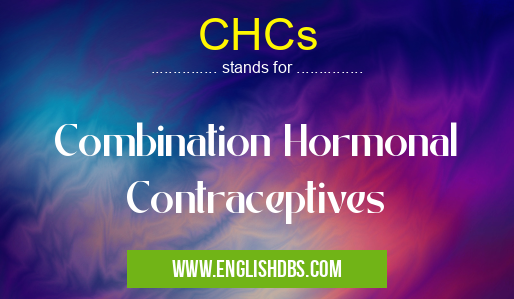What does CHCS mean in DRUGS
Combination Hormonal Contraceptives (CHCs) are a type of contraception that combine estrogen and progestin. They are available in several forms, including pills, patches, and rings. CHCs work by preventing ovulation and thickening cervical mucus, making it more difficult for sperm to reach the egg.

CHCs meaning in Drugs in Medical
CHCs mostly used in an acronym Drugs in Category Medical that means Combination Hormonal Contraceptives
Shorthand: CHCs,
Full Form: Combination Hormonal Contraceptives
For more information of "Combination Hormonal Contraceptives", see the section below.
Types of CHCs
- Oral Contraceptives (OCs): Also known as birth control pills, are taken daily. They come in various formulations, including monophasic, multiphasic, and extended-cycle pills.
- Transdermal Patch (TP): A small patch worn on the skin for three weeks, releasing hormones through the skin.
- Vaginal Ring (VR): A flexible ring inserted into the vagina for three weeks, releasing hormones that are absorbed into the bloodstream.
Mechanism of Action
- Ovulation Inhibition: CHCs suppress the release of gonadotropins, which are hormones that stimulate ovulation.
- Thickening of Cervical Mucus: Progestin increases the viscosity of cervical mucus, creating a barrier that makes it difficult for sperm to reach the egg.
Benefits of CHCs
- Highly Effective: CHCs are highly effective in preventing pregnancy when used correctly and consistently.
- Cycle Regulation: CHCs regulate menstrual cycles, making them more predictable and reducing cramping and bleeding.
- Other Benefits: CHCs have been associated with reduced risk of certain cancers, such as ovarian and endometrial cancer, and improved skin health.
Side Effects of CHCs
- Nausea and Vomiting: May occur in the first few months of use.
- Breast Tenderness: Can be a side effect, especially in the first few months.
- Weight Gain: Some CHCs may cause a slight weight gain.
- Other Side Effects: Less common side effects include mood changes, decreased libido, and spotting between periods.
Essential Questions and Answers on Combination Hormonal Contraceptives in "MEDICAL»DRUGS"
What are combination hormonal contraceptives (CHCs)?
CHCs are birth control methods that combine estrogen and progestin hormones to prevent pregnancy. They come in different forms, including pills, patches, and rings.
How do CHCs work?
CHCs work by inhibiting ovulation, thickening cervical mucus, and altering the uterine lining. By preventing ovulation, they eliminate the release of an egg from the ovary. The thickened cervical mucus makes it difficult for sperm to reach the egg, and the altered uterine lining prevents an embryo from implanting.
What are the different types of CHCs?
CHCs are available in various forms, including:
- Oral contraceptive pills (birth control pills)
- Transdermal contraceptive patches
- Vaginal contraceptive rings
How effective are CHCs?
CHCs are highly effective when used correctly. With perfect use (taking pills on time every day), they are 99% effective at preventing pregnancy. With typical use (missing occasional pills), they are 91% effective.
Are CHCs safe to use?
CHCs are generally safe for most women. However, certain individuals with specific medical conditions may not be suitable for CHC use. It's important to consult with a healthcare professional to assess individual risk factors.
What are the potential side effects of CHCs?
CHCs may have side effects, which can vary depending on the individual. Common side effects include:
- Irregular bleeding or spotting
- Nausea
- Breast tenderness
- Mood changes
Who should not use CHCs?
CHCs are not suitable for everyone. Certain individuals should not use CHCs, including:
- Women with a history of blood clots or stroke
- Women with certain types of cancer
- Women with uncontrolled high blood pressure
- Women who are pregnant or breastfeeding
Final Words: CHCs are a highly effective and widely used method of contraception. They offer various benefits, including cycle regulation and potential health benefits. However, it's important to discuss the potential side effects with a healthcare provider before starting any contraceptive method.
